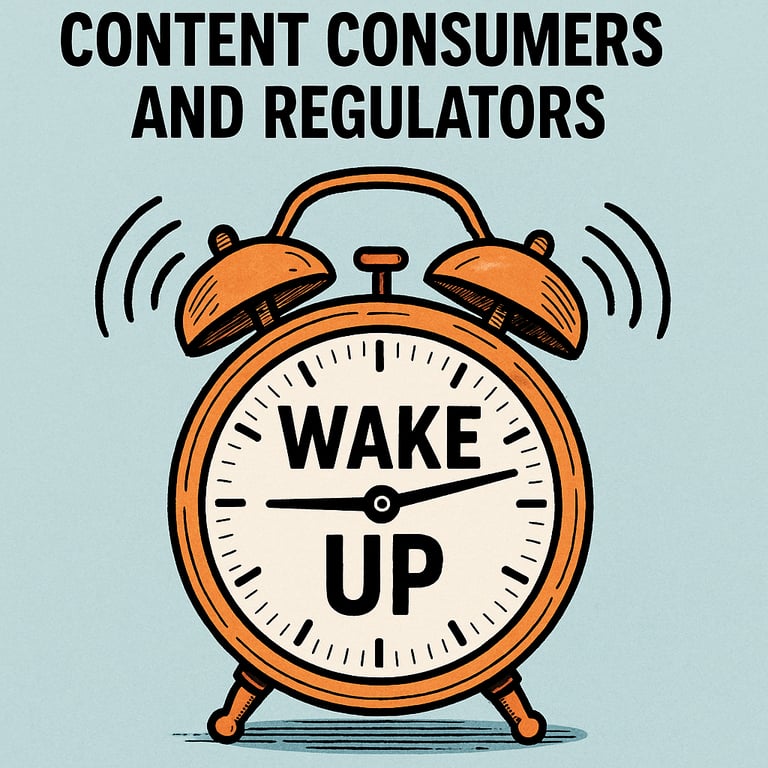Time to Wake Up Content Consumers and Regulators
Is your favorite content being suppressed by paid ads? Explore the detrimental impact of platform algorithms on organic reach and discover why it's time for consumers and regulators to demand change in the digital content ecosystem.
CONTENTPRENEUR
Ai Nomad
8/30/20253 min read


China's Crackdown on Ad Spending: A Wake-Up Call for Content Platforms
The recent news from China regarding a crackdown on corporate ad spending is sending ripples through platforms heavily reliant on this revenue stream. This development aligns with a growing sentiment that the current "pay-to-play" model profoundly damages the entire content ecosystem. I believe this move is not only necessary but also a critical step towards restoring balance and quality to online content.
My perspective, shared by many, is that platforms have intentionally manipulated their algorithms to prioritize content from advertisers. If you don't pay for traffic, your content is often relegated to a "general" or "low-value" pool, leading to diminished account weight and visibility, regardless of its quality. This creates an environment where content promotion is dictated by financial investment rather than intrinsic merit, leading to a "bad money drives out good" scenario and a vicious cycle that harms creators and consumers alike. This manipulative practice by platforms, driven by a myopic pursuit of growth, is both unethical and detrimental to the long-term health of the digital content landscape.
The Detrimental Impact of Pay-to-Play on Content Ecosystems
The current advertising-driven model often forces platforms to prioritize revenue over content quality. This creates a significant information asymmetry where platforms hold disproportionate power over content visibility. Let's delve into some evidence and logical arguments to support this claim:
Algorithm Bias and Suppressed Organic Reach:
Research has consistently shown that social media and content platforms have been decreasing the organic reach of posts over the past decade. For instance, studies by companies like Social@Ogilvy as far back as 2014 indicated that the average organic reach for Facebook brand pages had dropped to a mere 6%, plummeting from 16% in 2012. While these specific numbers may fluctuate, the trend of declining organic reach continues across various platforms, effectively pushing creators towards paid promotion to maintain visibility. This isn't a natural evolution; it's a strategic shift designed to monetize content distribution.
Facebook Zero: Considering Life After the Demise of Organic Reach
The "Pay-to-Play" Imperative: Platforms like TikTok,
while not explicitly stating a pay-to-play model for individual content, have introduced extensive advertising options that significantly boost content visibility. Anecdotal evidence from countless creators suggests that content promoted through their "Promote" feature or similar ad tools consistently outperforms organically uploaded content, even if the organic content is of higher quality. This creates a perverse incentive where creators are compelled to spend money to be seen, rather than focusing solely on creating exceptional content.
Erosion of Content Quality and Diversification:
When financial investment becomes the primary determinant of content reach, the focus shifts from meritocracy to capitalocracy. This means that well-funded corporations or individuals can dominate content feeds, potentially drowning out smaller creators with innovative or niche content who lack the advertising budget. This can lead to a homogenization of content, as platforms prioritize what generates ad revenue, rather than fostering diverse and high-quality material. The audience is then deprived of genuinely valuable content that cannot compete with paid promotion.
The Vicious Cycle of Devalued Content:
The constant push for paid promotion devalues organic content. When users become accustomed to seeing primarily promoted posts, their engagement with organic content may decrease, further justifying the platform's algorithms in suppressing it. This creates a negative feedback loop where platforms can claim organic reach is declining due to user preferences, when in fact, it's a consequence of their own algorithmic manipulation.
Economic Impact on Small Businesses and Independent Creators:
This system disproportionately harms small businesses, startups, and independent creators who often lack the substantial marketing budgets of larger corporations. Their ability to reach their target audience organically is severely curtailed, hindering their growth and innovation. This creates an uneven playing field that stifles competition and creativity.
Moving Towards a Healthier Content Ecosystem
China's regulatory actions, if focused on curbing manipulative algorithmic practices and promoting fair content distribution, could serve as a model for other nations. A healthier content ecosystem would prioritize:
Algorithmic Transparency:
Platforms should be more transparent about how their algorithms rank and distribute content, allowing creators to understand how their content is being evaluated beyond just ad spend.
Rewarding Quality and Engagement:
Algorithms should genuinely prioritize content based on user engagement, watch time, positive sentiment, and other indicators of true value, rather than simply how much money was spent on promotion.
Fair Competition:
Regulations that prevent platforms from artificially suppressing organic reach to force ad spending are crucial for fostering a more equitable environment for all creators.
The current trajectory of many content platforms is unsustainable and ultimately detrimental to the digital public sphere. By continuing to prioritize short-term ad revenue over content quality and creator equity, these platforms risk alienating both their creators and their audience. China's crackdown, while potentially disruptive in the short term, could be a necessary catalyst for a much-needed re-evaluation of how online content is valued and distributed globally.
